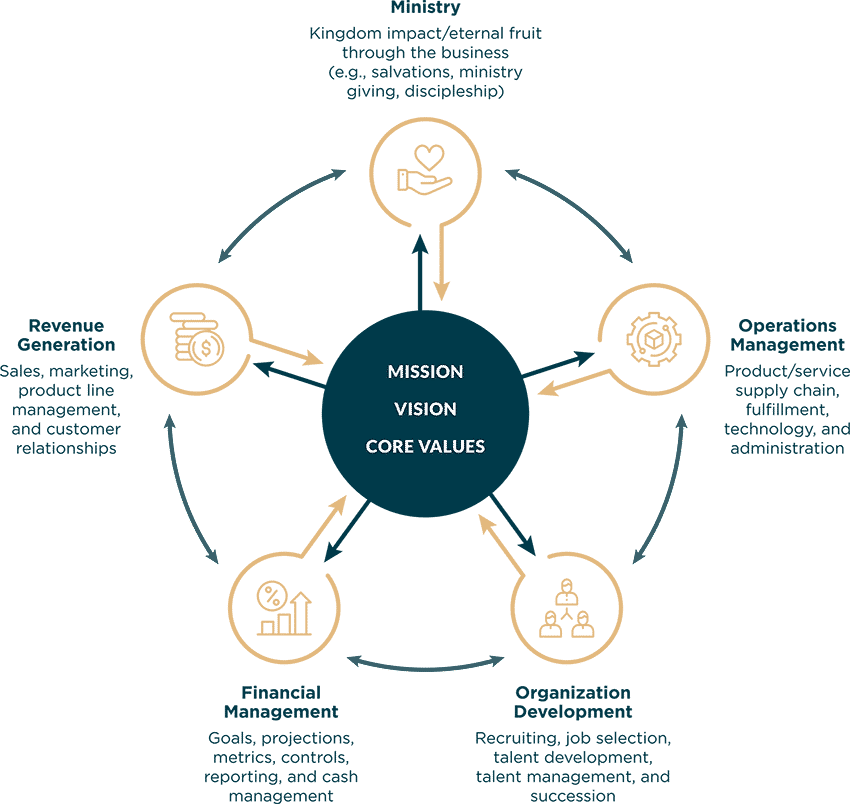Viewing the Workplace as the Place for Ministry
Why don’t people say “TGIM?”
“TGIF!” (Thank God it’s Friday) is a popular exclamation for those longing for the end of a workweek when “real life” begins.
When you tell people how excited you are for Monday (“TGIM”), people kind of tilt their heads and squint their eyes in a way that indicates confusion or skepticism. Many people do not enjoy their jobs. Even leaders and business owners often feel more like slaves to their companies.
What if work was not only sacred (mattering to God) but also the very setting to change the world? What if Monday was like #BaaM (business as a ministry) D-Day—the launching point of a campaign to experience and witness the very Kingdom of God?
While delivering the most radical campaign speech in the history of human leadership (the Sermon on the Mount), the apprentices of Jesus asked their rabbi how they should pray. Jesus had been announcing that a new “kingdom” was beginning and inviting folks to experience it. In modern language, it was the introduction of the “Jesus administration.” Jesus responded with words millions of Americans can recite as part of our post-Christian social conscience:
“Our Father in heaven,
hallowed be your name.
Your kingdom come,
your will be done,
on earth as it is in heaven.”
(Matt. 6:9-10)
When Jesus instructed this model prayer, what exactly was He suggesting? For people to live for the weekend and then think about harps and clouds? If the lives of Jesus and His disciples are any indication, evidence would suggest that the thrust of this prayer is something entirely more radical and domestic. Something is to come, to be done, “on earth,” which would seem to include where we go to work—right here and now.
What would it look like to pray and live, “Your kingdom come at work?” Certainly, we are called to gather in and serve through local churches. But if the Great Commission was a sport, Sundays would be the locker-room huddle, whereas the workweek would be when we get in the game!
It’s biblically normative to find the “Jesus administration” active in the marketplace. The context of life-changing ministry and the greatest social revolution in the history of mankind was at the intersection of common people in common places. Of the 132 biblical stories of Jesus, 122 happened in the marketplace. A vast majority of His teaching, healing, disciple-making, and engagement of society happened during business hours on business days in places where people least expected to encounter God. Of the 40 miraculous events recorded in the Acts of the Apostles, 39 occur outside of any religious setting.
What would it mean for us—followers of Jesus in the marketplace—to embrace the invitation of the Lord’s Prayer in business? The same year that the “balanced scorecard” entered the American lexicon (1992), C12 leaders began working out a paradigm for an eternally-balanced scorecard, ultimately called the 5-Point Alignment Matrix.

It frames the question, “What could be impacted when business is viewed as a ministry?” Everything.
The policies of the Jesus administration affect hiring, employee benefits, product and process quality, leadership, accountability, contracting, disputes, and corporate citizenship. What if a business was not merely an economic engine called to a minimalistic ethic of “do no harm,” but a sacred platform poised for significant impact on society? What if the Lord’s prayer is an invitation for businesses to exist for a greater purpose? Maybe more importantly, what would happen if we accepted that invitation?!
In nearly 30 years of serving marketplace leaders, we have found the answer to be things like:
- A view of all people as created in the image of God and treated as such
- Strategic planning shaped by biblical principles
- Organizational cultures and values reshaped by servant leadership
- Unprecedented generosity (With over 2,700 Members, and the average company doing more than $200,000 in annual ministry giving beyond personal charitable giving, the C12 community distributes hundreds of millions of dollars towards Gospel endeavors every year.)
- Reduced turnover, increased performance and engagement, and overall flourishing
- Resilient teams and ministers of conflict resolution
- Even surviving a global pandemic
The results have been incredible: God glorified by companies that reflect the Jesus administration, businesses outperforming peers and achieving all of the marketplace accolades for financial and cultural health, and tens of thousands of people coming to know Jesus through workplace encounters.
You can read books, join peer groups, seek counsel, and consume massive resources on the implication of faith-fueled work. On Monday, however, will you dare to recite the Lord’s Prayer in the business God has destined you to steward for Him?
Saying and believing those simple words will change what you do, how you do, and why you do everything. Living out the policies of the Jesus administration will transform you, your department, and the company and can literally change the world. Less than 40 percent of Americans attend a local church, but 90 percent will go to work on Monday. If you will really pray “Your Kingdom come, Your will be done—here” at your workplace, and then live it out, you might find yourself saying “TGIM.” Those who work with you will, too.
November 12, 2020

